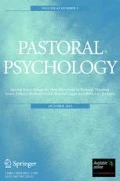Abstract
Ambiguous loss is a newly identified type of loss that occurs when a loved one is physically present, but psychologically absent. Dementia is just one example. Because the lost person is here, but not here, grief is frozen, life is put on hold, and people are traumatized. With no official verification of death, no possibility of closure, and no rituals for support, there is no resolution of grief (Boss 1999). Clergy, especially pastoral counselors, can witness and provide comfort for such uncanny loss because people rely on them for support, not just from the clear loss of death, but from the ambiguous losses, catastrophic and ordinary, that inevitably will occur across the life course.
Similar content being viewed by others
Notes
While the ambiguous loss theory is useful as well for understanding and intervening with distressed communities (congregations, for example, where a pastor is incapacitated), I limit my focus here to the couple and family levels. For details, see Boss (1999, 2006) and www.ambiguousloss.com.
Sometimes, if the loss is so incomprehensible, people say it never will make sense (e.g., a suicide without a note). I tell them that this is also a meaning—it will never make sense! That bring us back to the nonsensical and how people still find new hope. See Boss (2006).
There are times when ambivalence leads to ambiguity such as when someone is conflicted about having a test for cancer, let’s say, and then discovers it is too late to be treated for it; or when the young man whose father has Lou Gehrig’s disease prefers to live with the ambiguity rather than risking the knowledge that he has the same fate as his father.
This article should not be viewed as training, but rather as information about a new kind of loss that is common in congregations. I refer you to Boss (2006) for more details. For further information about training as a certified pastoral counselor, see www.aapc.org.
References
Blieszner, R., Roberto, K. A., Wilcox, K. L., Barham, E. J., & Winston, B. L. (2007). Dimensions of ambiguous loss in couples coping with mild cognitive impairment. Family Relations, 56(2), 196–209.
Boss, P. (1999). Ambiguous loss: learning to live with unresolved grief. Cambridge: Harvard University. Paperback reprint in 2000.
Boss, P. (2002). Ambiguous loss: working with families of the missing. Family Process, 41(1), 14–17.
Boss, P. (2004). Ambiguous loss research, theory, and practice: reflections after 9/11. Journal of Marriage & Family, 66(3), 551–566.
Boss, P. (2006). Loss, trauma, and resilience: therapeutic work with ambiguous loss. New York: Norton.
Boss, P. (Ed.). (2007a). Ambiguous loss. [Special issue]. Family Relations, 56(2).
Boss, P. (2007b). Ambiguous loss theory: challenges for scholars and practitioners. Family Relations, 56(2), 105–111.
Boss, P., & Greenberg, J. (1984). Family boundary ambiguity: a new variable in family stress theory. Family Process, 23(4), 535–546.
Boss, P., Beaulieu, L., Wieling, E., Turner, W., & LaCruz, S. (2003). Healing loss, ambiguity, and trauma: a community-based intervention with families of union workers missing after the 9/11 attack in New York City. Journal of Marital & Family Therapy, 29(4), 455–467.
Bowlby, J. (1973). Separation: anxiety and anger. New York: Basic.
Bowlby, J. (1980). Loss: sadness and depression: Vol. 3. Attachment and loss series. New York: Basic.
Family Caregiver Alliance (2003). Fact sheet: facts and figures. Who are the caregivers? Retrieved April 3, 2009, from http://www.caregiver.org/caregiver/jsp/content_node.jsp?nodeid=892.
Feilgeson, C. (1993). Personality death, object loss, and the uncanny. International Journal of Psychoanalysis, 74(2), 331–345.
Frankl, V. (1963). Man’s search for meaning: an introduction to logotherapy. New York: Washington Square.
Freud, S. (1917). Mourning and melancholia. In J. Strackey (Ed.), The standard edition of the complete psychological works of Sigmund Freud (p. 237–258). New York: Norton. Original work published 1917.
Kaplan, L., & Boss, P. (1999). Depressive symptoms among spousal caregivers of institutionalized mates with Alzheimer’s: boundary ambiguity and mastery as predictors. Family Process, 38(1), 85–103.
Kübler-Ross, E. (1969). On death and dying. New York: Macmillan.
Kushner, H. S. (1981). When bad things happen to good people. New York: Schocken.
Merton, R. K., & Barber, E. (1963). Sociological ambivalence. In E. Tiryakian (Ed.), Sociological theory: values and sociocultural change (pp. 91–120). New York: Free.
Weigert, A. J. (1991). Mixed emotions: certain steps toward understanding ambivalence. Albany: State University of New York.
Author information
Authors and Affiliations
Corresponding author
Rights and permissions
About this article
Cite this article
Boss, P. The Trauma and Complicated Grief of Ambiguous Loss. Pastoral Psychol 59, 137–145 (2010). https://doi.org/10.1007/s11089-009-0264-0
Published:
Issue Date:
DOI: https://doi.org/10.1007/s11089-009-0264-0



